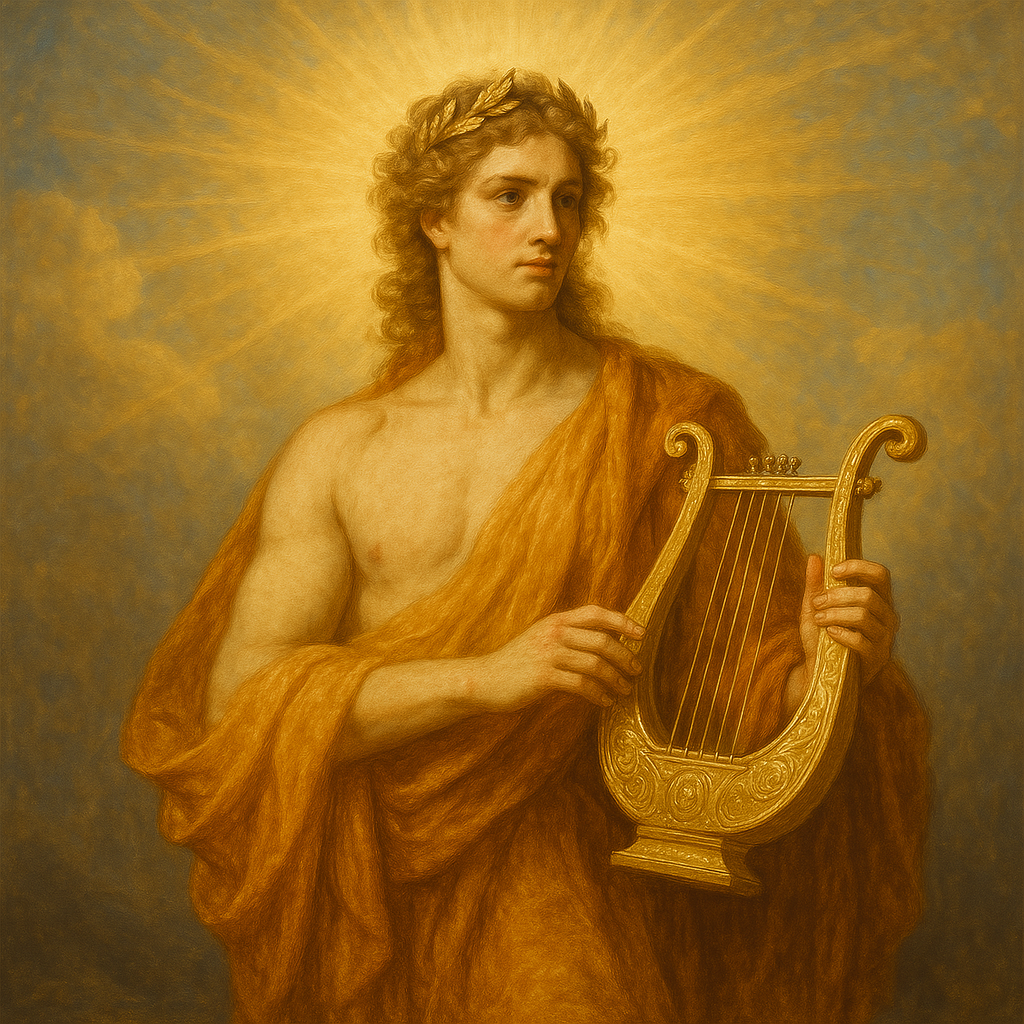Overview
Apollo is one of the most revered and multifaceted gods in Greek mythology, embodying the harmonizing forces of music, prophecy, healing, and the sun. A son of Zeus and twin brother of Artemis, Apollo represents light in both the literal and symbolic sense—governing clarity of thought, artistic inspiration, physical vitality, and spiritual truth. His Roman counterpart shares the same name, and his worship extended far beyond Greece, influencing Roman, Etruscan, and later esoteric traditions.
Origins and Mythology
Apollo is the son of Zeus, king of the gods, and Leto, a Titaness. Pursued by Hera’s wrath, Leto gives birth to Apollo and Artemis on the sacred island of Delos. From the moment of his birth, Apollo is associated with divine power, light, and beauty.
He emerges in mythology as:
- The slayer of the serpent Python, guardian of the Delphic Oracle, establishing his role as a god of prophecy.
- A youthful and radiant figure whose powers unify art, intellect, and divine order.
Apollo’s myths span from heroism and healing to tragedy and unfulfilled love, showcasing his dual nature as both rational and passionate, healer and punisher.
Symbols and Iconography
Apollo is traditionally depicted as a handsome, beardless young man, often crowned with laurel leaves and carrying instruments or weapons that signify his diverse roles.
Common Symbols
- Lyre – The instrument of harmony and music, gifted by Hermes, representing artistic creation and emotional resonance.
- Laurel Wreath – A symbol of victory and poetic inspiration, stemming from the myth of Daphne.
- Bow and Arrows – Associated with his role as a swift and powerful avenger, as well as bringer of sudden illness or cure.
- Sun Chariot – In later mythology, Apollo is said to drive the chariot of the sun across the sky.
- Raven, Swan, and Python – Sacred animals tied to his wisdom, prophecy, and origin myth.
- Tripod and Omphalos – Tools of divination at Delphi, symbolizing the center of the world and the oracle’s power.
Attributes and Powers
1. God of Music and the Arts
Apollo is the patron of music, poetry, and the Muses. His lyre brings harmony to the cosmos, and his presence inspires creativity, aesthetic beauty, and eloquence in speech and song.
2. God of Healing and Medicine
As the father of Asclepius, the god of medicine, Apollo is closely associated with healing, purification, and the prevention of disease. He can both inflict plague and restore health, embodying the power of medicine and its dual edges.
3. God of Prophecy and Truth
Apollo is the god of oracle wisdom, especially at Delphi, where his priestess, the Pythia, delivered cryptic insights from the divine. He represents clarity, foresight, and inner truth, helping mortals align with cosmic order.
4. God of Light and the Sun
Although originally distinct from Helios, Apollo became identified with the sun’s brilliance in later mythology. He symbolizes illumination, consciousness, and divine presence, shining light on ignorance and darkness alike.
5. God of Reason and Order
Apollo embodies the Apollonian ideal—clarity, discipline, harmony, and rationality. In contrast to Dionysus’s wild ecstasy, Apollo’s influence promotes structure, moderation, and refinement.
Key Myths and Stories
The Slaying of Python
Apollo slays Python, a monstrous serpent that guarded the oracle of Gaia at Delphi. By defeating it, Apollo establishes the Delphic Oracle, becoming the divine source of prophecy and spiritual guidance.
Apollo and Daphne
Apollo falls in love with Daphne, a nymph who flees from his pursuit. As he nears her, she prays to be saved and is transformed into a laurel tree, which Apollo honors forever as sacred. This myth reflects the unattainable nature of divine love and the transmutation of passion into art and memory.
Apollo and Hyacinthus
Apollo loves the beautiful youth Hyacinthus, who tragically dies from a discus accident. From Hyacinthus’s blood, Apollo creates the hyacinth flower, immortalizing his grief and love. This story exemplifies Apollo’s tender side and the deep emotional resonance of his mythos.
Temples and Worship
Delphi – The Oracle of Apollo
The most famous sanctuary of Apollo was at Delphi, believed to be the center of the world.
- The Temple of Apollo housed the Delphic Oracle, where the Pythia transmitted Apollo’s wisdom.
- Delphi was a major site of pilgrimage, ritual purification, and consultation for individuals and city-states alike.
Delos – Birthplace and Sacred Island
The island of Delos was sacred to Apollo and Artemis. It hosted festivals, temples, and games in his honor.
Festivals
- Pythian Games – Held every four years at Delphi, featuring athletic contests, music, and poetry in celebration of Apollo.
- Thargelia and Delia – Seasonal festivals invoking Apollo’s blessings for health, purification, and agriculture.
Apollo was honored by artists, philosophers, healers, athletes, and seekers of truth, making his worship both broad and deeply personal.
Spiritual and Archetypal Significance
In archetypal and modern spiritual frameworks, Apollo represents:
- The Enlightened Mind – Intelligence, intuition, and the pursuit of wisdom.
- The Artist and Visionary – The impulse to create beauty, harmony, and meaningful expression.
- The Healer – A bridge between physical and spiritual medicine, transformation through balance.
- The Solar Archetype – Illumination, personal power, clarity of purpose, and spiritual awakening.
Practitioners may connect with Apollo for:
- Creative inspiration in art, writing, or music
- Clarity of vision or guidance through dreams and divination
- Healing of the mind and spirit
- Strengthening solar energy, discipline, and willpower
Conclusion
Apollo, radiant god of music, healing, prophecy, and sunlight, remains a guiding force of illumination, beauty, and higher wisdom. He teaches that the divine expresses itself through clarity, compassion, and creativity, and that both intellect and emotion have sacred value. As the harmonizer of opposites—light and shadow, logic and love—Apollo endures as a timeless symbol of the human soul’s journey toward wholeness, inspiration, and radiant truth.

